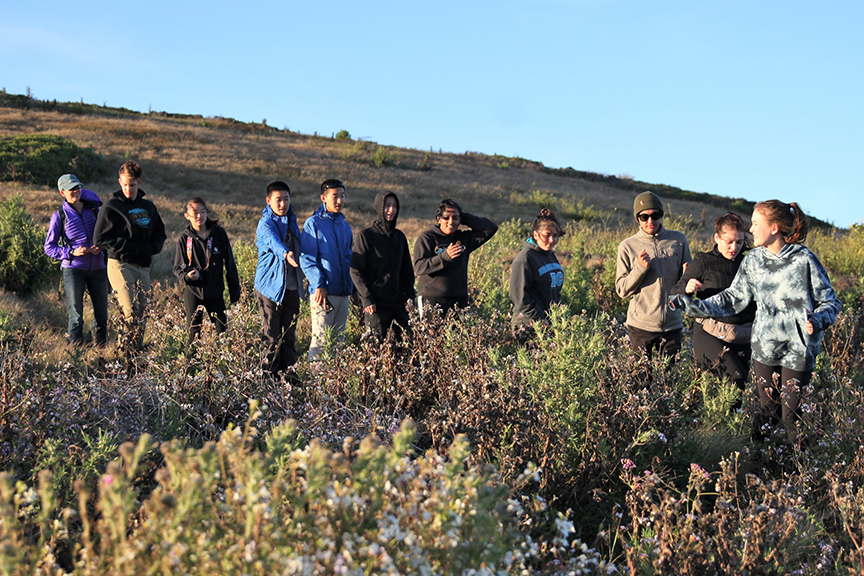Update: Aug. 25, 2017
Great article by participant Edwin Su, grade 11, on what he gleaned from this great program:
http://inianislandsinstitute.org/2017/08/04/harker-school-to-inian-islands-institute/
Update July 13, 2017
While in Alaska, the Human Ecology class members continued to explore the issues they had been learning about in California, with an Alaskan focus. “We learned about fisheries and energy issues and had lots of opportunities to connect with nature,” noted Kate Schafer, who, with fellow upper school science teacher Chris Spenner, is leading the class.
Highlights included a hike to the outflow of the Mendenhall Glacier, a morning spent with a Tlingit tribal elder at the Alaska State Museum and a day spent on Glacier Bay with ample wildlife sightings including grizzly bears, mountain goats, whales, Steller sea lions, puffins, marbled murrelets and many other species of birds, and spectacular views of the Margerie Glacier.
“Students really appreciated the friendliness and freedom they experienced during their time spent in the small town of Gustavus,” said Schafer. “While there, we met with the author of a book we read about John Muir, did some trail maintenance with some local high school students and visited the hydropower plant that provides electricity for the town.”
The course culminated in four nights out at the Hobbit Hole on the Inian Islands, where the group, isolated from the internet and outside world, really got to connect with nature. Students gave up their phones during the time at the Hobbit Hole as a way to be better present in the moment and appreciate the experience of being at such an isolated place.
“Overall, the course was an amazing experience for all,” said Schafer. “Students will be sharing their final projects at an event in October and some will also be traveling to New Orleans in December to share what they’ve learned with a wider audience at the American Geophysical Union conference.” Go Nature Eagles!
June 27, 2017
Harker’s Human Ecology students sojourned last week to Bodega Bay for a stay at the UC Davis Bodega Marine Lab to learn about marine science, especially in the context of fisheries and the impact of ocean acidification on marine ecosystems. The group, led by Harker upper school science teachers Kate Schafer and Chris Spenner, conducted research on conditions in the tide pools and presented results to a group of students visiting from the Lawrence Hall of Science.
Students in the Human Ecology: Our Place in Nature class spend 10 days in California exploring our place in nature, not just as scientists, but as policymakers, journalists, artists and concerned citizens. They then spend 10 days in southeast Alaska, in and around Glacier Bay, exploring the same themes in a different place and culture, among different people.
After Bodega Bay, the group headed to the Pescadero area, where they camped under the redwoods at Butano State Park and continued their exploration of nature and human impact. While there, in addition to experiencing the beauty of the place, the group learned about the complex issues of land use and farming in areas with vital habitat for salmon and other endangered species.
They studied the issue of sustainable farming, both from the perspective of sustaining the land and providing sustainable conditions for people working on the land. The group also visited Pie Ranch and baked some delicious strawberry rhubarb pies with ingredients harvested from the farm, then met with Ben Ranz from an organization in Pescadero called Puente. This group is dedicated to providing support to the San Mateo coastal community members, many of whom are immigrant farm workers from Mexico. The group is now in Alaska.
“The trip was amazing and we are heading off on our first full day in Juneau,” said Schafer. We’ll be updating this story as the reports come in!
